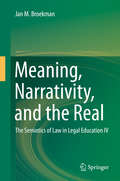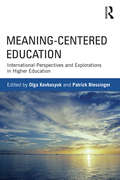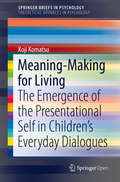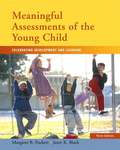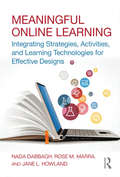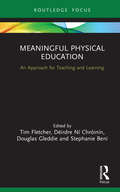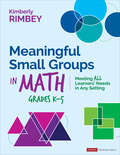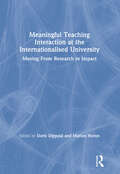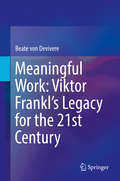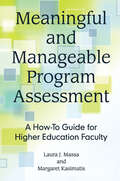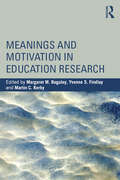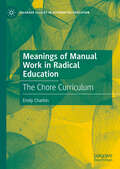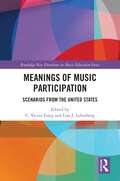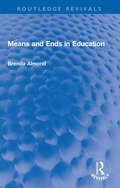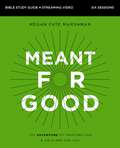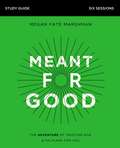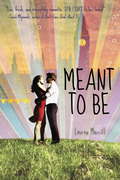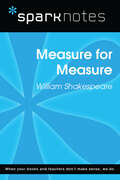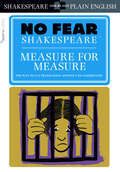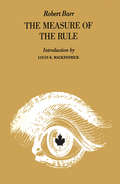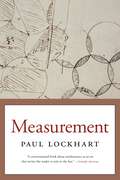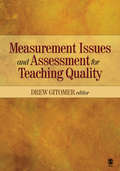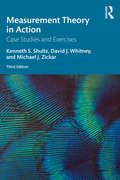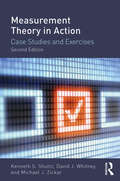- Table View
- List View
Meaning, Narrativity, and the Real
by Jan M. BroekmanThis book examines the concept of meaning and ourgeneral understanding of reality in a legal and philosophical context. Startingfrom the premise that meaning is a matter of linguistic and other forms ofarticulation, it considers the inherent philosophical consequences. PartI presents Klages', Derrida's, Von Hofmannsthal's and Wittgenstein'sexplorations of silence as a source of articulation and meaning. Debatesabout 20th century psychologism gave theattitude concept a pivotal ro≤ it illustrates the importance of the discoverythat a word is globally qualified as 'the basic unit of language'. Thisis mirrored in the fact that we understand reality as a matter of particles andthus interpret the real as a component of an all-embracing 'particle story'. Each chapter of the book focuses on an aspect of legal semiotics relatedto the chapter's theme: for instance on the meaning of a Judge's 'Saying forLaw', on law students training in varying attitudes or on the ties between lawand language. Part II of the book illustrates our generalunderstanding of reality as a matter of particles and partitioning, andexamines texts that prove that particle thinking is basic for our meaningconcept. It shows that physics, quantum theory, holism, and modern brainresearch focusing on human linguistic capabilities, confirm their ties to theparticle story. In contrast, the book concludes that partitions and particlesare neither a fact in the history of the cosmos nor a determinant of knowledgeand the sciences, and that meaning is a process: a constellation rather than afixation. This is manifest once one understands meaning as the result ofcontinuously changing attitudes, which create our narratives on cosmos andcreation. The book proposes a new key for meaning: a linguistic occurrenceanchored in dimensions of human narrativity.
Meaning-Centered Education: International Perspectives and Explorations in Higher Education
by Patrick Blessinger Olga KovbasyukIn a time of globally changing environments and economic challenges, many institutions of higher education are attempting to reform by promoting standardization approaches. Meaning-Centered Education explores the counter-tide for an alternative vision of education, where students and instructors engage in open meaning-making processes and self-organizing educational practices. In one contributed volume, Meaning-Centered Education provides a comprehensive introduction to current scholarship and pedagogical practice on meaning-centered education. International contributors explore how modern educational scholars and practitioners all around the world are implementing a comprehensive framework that supports meaning making in a classroom. This edited collection is a valuable resource for higher education faculty and scholars interested in renewing the deep purposes of higher education.
Meaning-Making for Living: The Emergence of the Presentational Self in Children’s Everyday Dialogues (SpringerBriefs in Psychology)
by Koji KomatsuThis Open Access Brief analyzes the dynamics in which children’s selves emerge through their everyday activities of meaning construction, both in their relationships with family and within school education. It begins with a discussion of new psychological inquiries into children's selves and builds upon the innovative theoretical notion of the Presentational Self, developed by the author over the last decade. The book illustrates how the observation of children’s meaning construction in their everyday lives becomes a starting point for theoretical and empirical inquiries into child development and gives a framework that promotes new inquiries in this area. The book describes the Presentational Self Theory as a sense of how the notion of the Self is being worked upon in everyday life encounters. Chapters feature in-depth analyses of exchanges between adults and children in the Japanese cultural context. Meaning-Making for Living will be of interest to researchers and graduate students in the fields of cognitive, social, developmental, educational, and cultural psychology.
Meaningful Assessments of the Young Child: Celebrating Development and Learning
by Margaret Puckett Janet BlackThis book is not for the “tired and timid” but for those committed professionals who wish to think through a plan that is coherent, cohesive, learner- and family-focused, and work through the development of a defensible (reliable and valid) authentic assessment system. Discusses emerging research in the area of brain development research and its implication for assessment practices. Provides information on the “standards movement” and how these standards can have either a negative or positive impact on developmental goals. Adds a developmental continuum as an appendix to help teachers focus on emerging development rather than on perceived deficits in children. Provides an added chapter on portfolio systems. Places more emphasis on the discussions of diversity and inclusion. For educators and school administrators.
Meaningful Online Learning: Integrating Strategies, Activities, and Learning Technologies for Effective Designs
by Nada Dabbagh Jane L. Howland Rose M. MarraMeaningful Online Learning explores the design and facilitation of high-quality online learning experiences and outcomes through the integration of theory-based instructional strategies, learning activities, and proven educational technologies. Building on the authors’ years of synthesized research and expertise, this textbook prepares instructors in training to create, deliver, and evaluate learner-centered online pedagogies. Pre- and in-service K–12 teachers, higher education faculty, and instructional designers in private, corporate, or government settings will find a comprehensive approach and support system for their design efforts.
Meaningful Physical Education: An Approach for Teaching and Learning (Routledge Focus on Sport Pedagogy)
by Tim Fletcher; Déirdre Ní Chróinín; Douglas Gleddie; Stephanie BeniThis book outlines an approach to teaching and learning in physical education that prioritises meaningful experiences for pupils, using case studies to illustrate how practitioners have implemented this approach across international contexts. Prioritising the idea of meaningfulness positions movement as a primary way to enrich the quality of young people’s lives, shifting the focus of physical education programs to better suit the needs of contemporary young learners and resist the utilitarian health-oriented views of physical education that currently predominate in many schools and policy documents. The book draws on the philosophy of physical education to articulate the main rationale for prioritising meaningful experiences, before identifying potential and desired outcomes for participants. It highlights the distinct characteristics of meaningful physical education and its content, and outlines teaching and learning principles and strategies, supported by pedagogical cases that show what meaningful physical education can look like in school-based teaching and in higher education-based teacher education. With an emphasis on good pedagogical practice, this is essential reading for all pre-service and in-service physical education teachers or coaches working in youth sport.
Meaningful Small Groups in Math, Grades K-5: Meeting All Learners’ Needs in Any Setting (Corwin Mathematics Series)
by Kimberly Ann RimbeyTarget the Math…Support the Students…Provide Access for All The need for focused small group math instruction has never been greater. Today’s education landscape is fraught with learning divides unlike anything we’ve faced in recent years. We need new ways of teaching students who have remarkably varying levels of understanding and vastly different needs. Meaningful Small Groups in Math, Grades K-5 offers practical guidance on how to meet the diverse needs of today’s students. Written for K-5 classroom teachers, math interventionists and instructional coaches, this user-friendly, accessible book provides guidance on the necessary components of small group instruction in math, trajectories for small-group instruction on specific concepts, and practical steps for getting started. Readers will find Checklists and templates for implementing small group, sample lessons in the major content domains Emphasis on flexible groups Intervention and extension ideas for differentiating learning A chapter devoted to developing small-group programs across a school or organization Small group instruction in mathematics has not been as well-developed as its counterpart in the reading world. In K-5 math classrooms, small-group instruction has typically been reduced to learning centers and rotation stations, with little emphasis on differentiated, small-group, teacher-facilitated learning. To meet the needs of today’s students, a more focused approach is needed.
Meaningful Small Groups in Math, Grades K-5: Meeting All Learners’ Needs in Any Setting (Corwin Mathematics Series)
by Kimberly Ann RimbeyTarget the Math…Support the Students…Provide Access for All The need for focused small group math instruction has never been greater. Today’s education landscape is fraught with learning divides unlike anything we’ve faced in recent years. We need new ways of teaching students who have remarkably varying levels of understanding and vastly different needs. Meaningful Small Groups in Math, Grades K-5 offers practical guidance on how to meet the diverse needs of today’s students. Written for K-5 classroom teachers, math interventionists and instructional coaches, this user-friendly, accessible book provides guidance on the necessary components of small group instruction in math, trajectories for small-group instruction on specific concepts, and practical steps for getting started. Readers will find Checklists and templates for implementing small group, sample lessons in the major content domains Emphasis on flexible groups Intervention and extension ideas for differentiating learning A chapter devoted to developing small-group programs across a school or organization Small group instruction in mathematics has not been as well-developed as its counterpart in the reading world. In K-5 math classrooms, small-group instruction has typically been reduced to learning centers and rotation stations, with little emphasis on differentiated, small-group, teacher-facilitated learning. To meet the needs of today’s students, a more focused approach is needed.
Meaningful Teaching Interaction at the Internationalised University: Moving From Research to Impact
by Doris DippoldThis edited collection draws together the latest thinking, research and practical case studies related to classroom interaction at internationalised universities. Through evidence-based approaches which involve the analysis of and reflection on classroom interaction practices, this book examines issues related to classroom interaction in disciplinary higher education contexts, whilst addressing the question of how teachers and students can develop their ability in orchestrating and taking part in classroom interaction. Covering topics such as classroom interactional competence, ‘silent’ students, interaction and integration in multicultural classes, social factors in classroom talk, group interaction, oracy development and anti-bullying interventions, this title is ideal reading for postgraduate students, teacher trainers in higher education, scholars and researchers and anyone interested in higher education pedagogy and its development.
Meaningful Work: Viktor Frankl’s Legacy for the 21st Century
by Beate Von DevivereThis book offers meaningful work as one of the most relevant issues for 21st century workplaces, and organizations seeking to develop leadership and drive positive change. It uses Viktor Frankl’s legacy as a scientific and philosophical pioneer, while combining cutting edge research findings from the behavioural sciences, organizational and management research, and human resource development with outstanding examples of new work approaches of leadership from around the globe. In order to respond to 21st century demands on meaningful work, this book harnesses the power of living meaning, values, purpose and compassion in workplaces. Beate von Devivere shows managers, human resources experts, consultants, coaches, medical experts, students and counsellors as well as all dedicated individuals, how to find meaning in their organizations, their teams and individual functions and challenges, bringing Viktor Frankl’s approach to today’s workplaces. Integrating a wide range of knowledge and expertise, this book covers organizational development, management practice, and findings from psychology, neuroscience as well as therapeutic approaches and new work concepts. Meaningful work is promoting an integrated approach for the ‘Copernican turn’, further promoting meaningful work, purpose and a good life.
Meaningful and Manageable Program Assessment: A How-To Guide for Higher Education Faculty
by Laura J. Massa Margaret KasimatisIn this book, the authors provide readers with a straightforward approach to doing assessment in a way that is meaningful, manageable, and sustainable over time. Including a straightforward overview of assessment concepts and principles and practical, easy-to-follow instructions for multiple assessment tools and key steps in the assessment process, this book is a handy, all-in-one how-to guide. In addition, the text guides readers toward the development of a culture of assessment. Writing in a conversational tone that has helped the authors to successfully teach assessment principles and practices to faculty and administrators from a variety of academic disciplines and institutions, the book reads as if a friendly, supportive assessment professional is by your side.The book begins with an overview of the assessment process and key assessment concepts and principles. Subsequent modules provide detailed instructions and specific tips for carrying out each step of the process, including three modules focused on creating and implementing specific assessment measurement tools. The authors recommend readers begin by reading Module 1, which provides a framework that will enhance understanding of each of the steps of the process that are spelled out in detail in subsequent modules. However, after that, each of the modules is designed to stand alone. Readers need not read the modules in order nor do they need to read all of them in order to benefit from the authors’ guidance. In addition, the authors have created a video to accompany Module 10 in which they take readers step-by-step through the use of Excel spreadsheets to organize and present assessment data.
Meanings and Motivation in Education Research
by Martin C. Kerby Yvonne S. Findlay Margaret M. BaguleyMeanings and Motivation in Education Research demonstrates the vibrant and vital connection between the researcher and their research. Research is often perceived as an entity which is seemingly produced in isolation; however, there are many important factors which are involved, and this book explores the complexities of investigating the specific areas of meaning and motivation for researchers working in the education sector. With contributions from authors drawn from the field of education in various stages of their career, the perspectives shared in this book are from a diverse range of countries including Australia, Canada, Malaysia, the United Kingdom and the United States of America. Key topics include: personal and professional identity narrative inquiry as method teacher educators as researchers conducting education research mixed methods in educational research Foregrounding the personal experiences, interests and motivations of educational researchers Meanings and Motivation in Education Research proves important insights into current discussions in educational research including researchers’ identities, the ways they conduct research and most importantly the impact institutional and personal politics have on their work. This will be a valuable text for educators, education researchers, policy-makers and practitioners across the globe.
Meanings of Manual Work in Radical Education: The Chore Curriculum (Palgrave Studies in Alternative Education)
by Emily CharkinThis book aims to challenge and inspire readers with lived examples of alternatives to current paradigms in education, childhood and community, through new research into two important and neglected schools in the history of progressive and radical education. Kilguhanity and Wennington schools were both founded in the UK in 1940, and at both schools pupils and staff were extensively involved in the manual work of looking after and shaping the physical fabric of the community. The author uses these case studies to challenge the tendency to equate pupil participation with ‘voice’ and ‘meetings’, and casts light on a fault line within the progressive and radical traditions. She then presents new challenges and perspectives to ongoing debates about education and childhood, unsettling the stalemate between liberal and traditional, and progressive and radical schools by uncovering a community-based alternative. The book offers a contribution to a growing body of contemporary research literature on progressive and radical education, alternative education, informal education and social pedagogy as well as across the disciplines of childhood studies, history, philosophy and geography.
Meanings of Music Participation: Scenarios from the United States (Routledge New Directions in Music Education Series)
by C. Victor Fung Lisa J. LehmbergThis book uncovers the multifaceted nature of music participation through a collection of studies in a wide variety of musical contexts across the United States. The contributors combine personal voices and vivid narratives with scholarship to present many potential meanings of music participation, and lay out research-based implications for lifelong music education. Exploring music participation in choral and instrumental ensembles; school music classes and community groups; in-person and virtual spaces; among children, young adults, and older adults; and for native-born citizens and immigrants, the 10 original studies in this volume present a diverse portrait of musical engagement. The chapters draw out themes including enjoyment, identity development, learner autonomy, social interaction, motivation, commitment, and quality of life, and draw connections between musical meanings and philosophical principles from both Western and Eastern traditions. Linked by interludes that connect the empirical studies with philosophical interpretations, this volume brings together multiple methodologies and perspectives to consider the social, cultural, and psychological meanings of lifelong music participation. It offers a valuable resource for scholars, professionals, and students working in school and community music or music education research, as well as readers interested in general education, social psychology, lifelong learning, and aging studies.
Means and Ends in Education (Routledge Revivals)
by Brenda AlmondFirst published in 1982, Means and Ends in Education explores the contrasts between approaches to teaching where teaching is simply a means to some other end; approaches in which the end determines the means; and approaches in which means and ends are integrated and education serves an intrinsic purpose. The book considers the concept of education and evaluates different processes and techniques of teaching and learning. Divided into three parts, it covers instrumentalist approaches, learner-oriented approaches, and liberal approaches to education. It puts forward differing views as to what the term ‘education’ means to different professions and in different contexts, and how different approaches result in a very different experience for the recipient. It also discusses the extent to which an evaluation of methods of education and an evaluation of the aims of education are linked. Means and Ends in Education will appeal to those with an interest in the philosophy of education.
Meant for Good Bible Study Guide plus Streaming Video: The Adventure of Trusting God and His Plans for You
by Megan Fate MarshmanMeant for Good is a power-packed, video-based Bible study that looks at the truth that you can trust God's plans for your life—no matter what it looks like right now. Dynamic Bible teacher Megan Fate Marshman will help you and your group discover how to step into the hopeful future God has for you.Redefine your perspective on who and what matter most in your life. With authenticity and revealing insights into the character of God, Megan unpacks Jeremiah 29:11–14 and what exactly is meant by "good" from God's perspective. This Bible study will teach you that trusting God with everything—yes, EVERYTHING—is a life of adventure you simply couldn't plan for yourself.This study guide includes:Individual access to six streaming video teachings from MeganEngaging and evocative group discussion questions and activitiesIn-depth personal Bible study sessionsA section to track your experience as you grow in new spiritual practicesA series of spiritual formation practices for you to carry on well beyond the studyStreaming video access included. Access code subject to expiration after 12/31/2029. Code may be redeemed only by the recipient of this package. Code may not be transferred or sold separately from this package. Internet connection required. Void where prohibited, taxed, or restricted by law. Additional offer details inside.
Meant for Good Study Guide: The Adventure of Trusting God and His Plans for You
by Megan Fate MarshmanMeant for Good is a power-packed, biblical look at the truth that you really can trust God's plan for your life—no matter what your life looks like right now. Dynamic Bible teacher Megan Fate Marshman will help you discover how to stop discounting yourself from a hopeful future, start living in active dependence on God, and find your way to the perfect plan He has for you in this six-session video Bible study (DVD/digital downloads sold separately). With authenticity and revelatory insights into the character of Jesus, Megan shares an engaging and fresh look at the core themes within the well-loved scripture of Jeremiah 29:11-14. Through winsome and inspiring stories, Meant for Good will show you how to trust God in your daily life, and more importantly, how to trust God's definition of good above your own.In this six-session video Bible study you will discover:The deeper truth behind Jeremiah 29:11-14 and gain profound perspective into trusting God in new ways. That your not-enoughness is exactly enough to God, and that in fact, you have everything you need to take that first step into the life God has for you.How to stop counting yourself out, because Jesus never has. God is up to something really good, and He's inviting you to join Him.How to hear and respond to God's voice, and intentionally grow a personal, intimate relationship with Him.How to defeat anxiety, trust God with all you're carrying and worrying about, and experience a life of freedom in relying on God's perfect control.Designed for use with the Meant for Good Video Study (sold separately).
Meant to Be
by Lauren MorrillMeant to be or not meant to be . . . that is the question. It's one thing to fall head over heels into a puddle of hazelnut coffee, and quite another to fall for the--gasp--wrong guy. Straight-A junior Julia may be accident prone, but she's queen of following rules and being prepared. That's why she keeps a pencil sharpener in her purse and a pocket Shakespeare in her, well, pocket. And that's also why she's chosen Mark Bixford, her childhood crush, as her MTB ("meant to be").But this spring break, Julia's rules are about to get defenestrated (SAT word: to be thrown from a window) when she's partnered with her personal nemesis, class-clown Jason, on a school trip to London. After one wild party, Julia starts receiving romantic texts . . . from an unknown number! Jason promises to help discover the identity of her mysterious new suitor if she agrees to break a few rules along the way. And thus begins a wild goose chase through London, leading Julia closer and closer to the biggest surprise of all: true love.Because sometimes the things you least expect are the most meant to be.
Measure for Measure (SparkNotes Literature Guide Series)
by SparkNotesMeasure for Measure (SparkNotes Literature Guide) by William Shakespeare Making the reading experience fun! Created by Harvard students for students everywhere, SparkNotes is a new breed of study guide: smarter, better, faster. Geared to what today's students need to know, SparkNotes provides: *Chapter-by-chapter analysis *Explanations of key themes, motifs, and symbols *A review quiz and essay topicsLively and accessible, these guides are perfect for late-night studying and writing papers
Measure for Measure: No Fear Shakespeare Side-by-Side Plain English (No Fear Shakespeare)
by William Shakespeare SparkNotesRead Shakespeare&’s plays in all their brilliance—and understand what every word means! Don&’t be intimidated by Shakespeare! These popular guides make the Bard&’s plays accessible and enjoyable.Each No Fear guide contains:The complete text of the original playA line-by-line translation that puts the words into everyday languageA complete list of characters, with descriptionsPlenty of helpful commentaryThis dark comedy, set in Verona, explores virtue and sin. Claudio has been arrested for getting his mistress pregnant—and Angelo, the strict, morality-spouting judge, has sentenced him to death. When Claudio&’s sister Isabella, a novice nun, begs Angelo to show mercy, he is instantly smitten . . . and offers Isabella a choice: her virginity for her brother&’s life.
Measure of the Rule
by Robert Barr Douglas Lochhead Louise K. MackendrickRobert Barr has been almost completely overlooked by critics and anthologists of Canadian literature, in part because, although he was educated in Canada, he spent most of his life in the United States and England. However, since most of his serious novels are either set in Canada or have some Canadian connection, Barr deserves attention. The Measure of the Rule, originally published in 1907, is the nearest he came to writing an autobiographical novel. It concerns the Toronto Normal School and the experiences there in the 1870s of a young man who undoubtedly is Barr himself. In this novel, Barr is exorcising unhappy memories and is ironic, even bitter, about the school's quality of education, the rigid discipline observed by its staff and their indifference to their students, and the sexual segregation practiced. A number of men under whom Barr actually studied are vividly caricatured. As a realistic study of Ontario's only central teacher-training institution in the late nineteenth century, The Measure of the Rule will appeal both to those interested in Canadian fiction of that period and to those more concerned with the evolution of the system of education established by Egerton Ryerson. Also included with this reprint of the novel is an essay originally published in 1899 and entitled 'Literature in Canada.' In this essay, Barr elaborated upon his opinions of the school system and its quality of education.
Measurement
by Paul LockhartPaul Lockhart’s Mathematician’s Lament outlined how we introduce math to students in the wrong way. Measurement explains how math should be done. With plain English and pictures, Lockhart makes complex ideas about shape and motion intuitive and graspable, and offers a solution to math phobia by introducing us to math as an artful way of thinking and living.In conversational prose that conveys his passion for the subject, Lockhart makes mathematics accessible without oversimplifying. He makes no more attempt to hide the challenge of mathematics than he does to shield us from its beautiful intensity. Favoring plain English and pictures over jargon and formulas, he succeeds in making complex ideas about the mathematics of shape and motion intuitive and graspable. His elegant discussion of mathematical reasoning and themes in classical geometry offers proof of his conviction that mathematics illuminates art as much as science.Lockhart leads us into a universe where beautiful designs and patterns float through our minds and do surprising, miraculous things. As we turn our thoughts to symmetry, circles, cylinders, and cones, we begin to see that almost anyone can “do the math” in a way that brings emotional and aesthetic rewards. Measurement is an invitation to summon curiosity, courage, and creativity in order to experience firsthand the playful excitement of mathematical work.
Measurement Issues and Assessment for Teaching Quality
by Drew GitomerOffering perspectives focused on the meaningful goal of measuring and assessing teacher quality, Measurement Issues and Assessment for Teaching Quality brings together leading researchers and practitioners from the fields of education, economics and policy who contribute provocative, illuminating, and coherent articles that explore key issues surrounding this vital topic. Features: Provides an in-depth examination of three thematic sections: Measuring Teaching Quality for Professional Entry, Measuring Teaching Quality in Practice, Measuring Teaching Quality in Context Includes section summaries by Drew Gitomer that highlight key issues and common themes that tie the articles togetherCloses with a summary and call to action by Lee Shulman, President of The Carnegie Foundation for the Advancement of Teaching Measurement Issues and Assessment for Teaching Quality is must reading for principals, educational administrators, and policymakers concerned with the dynamics of improving teacher quality.
Measurement Theory in Action: Case Studies and Exercises
by David J. Whitney Kenneth S Shultz Michael J ZickarMeasurement Theory in Action, Third Edition, helps readers apply testing and measurement theories and features 22 self-contained modules which instructors can match to their courses. Each module features an overview of a measurement issue and a step-by-step application of that theory. Best Practices provide recommendations for ensuring the appropriate application of the theory. Practical Questions help students assess their understanding of the topic. Students can apply the material using real data in the Exercises, some of which require no computer access, while others involve the use of statistical software to solve the problem. Case Studies in each module depict typical dilemmas faced when applying measurement theory followed by Questions to Ponder to encourage critical examination of the issues noted in the cases. The book’s website houses the data sets, additional exercises, PowerPoints, and more. Other features include suggested readings to further one’s understanding of the topics, a glossary, and a comprehensive exercise in Appendix A that incorporates many of the steps in the development of a measure of typical performance. Updated throughout to reflect recent changes in the field, the new edition also features: Recent changes in understanding measurement, with over 50 new and updated references Explanations of why each chapter, article, or book in each module’s Further Readings section is recommended Instructors will find suggested answers to the book’s questions and exercises; detailed solutions to the exercises; test bank with 10 multiple choice and 5 short answer questions for each module; and PowerPoint slides. Students and instructors can access SPSS data sets; additional exercises; the glossary; and additional information helpful in understanding psychometric concepts. It is ideal as a text for any psychometrics or testing and measurement course taught in psychology, education, marketing, and management. It is also an invaluable reference for professional researchers in need of a quick refresher on applying measurement theory.
Measurement Theory in Action: Case Studies and Exercises, Second Edition
by Kenneth S. Shultz Michael J. Zickar David J. WhitneyThis book helps readers apply testing and measurement theories. Featuring 22 self-standing modules, instructors can pick and choose the ones that are most appropriate for their course. Each module features an overview of a measurement issue and a step-by-step application of that theory. Best practices provide recommendations for ensuring the appropriate application of the theory. Practical questions help students assess their understanding of the topic while the examples allow them to apply the material using real data. Two cases in each module depict typical dilemmas faced when applying measurement theory followed by Questions to Ponder to encourage critical examination of the issues noted in the cases. Each module contains exercises some of which require no computer access while others involve the use of SPSS to solve the problem. The book's website houses the accompanying data sets and more. The book also features suggested readings, a glossary of the key terms, and a continuing exercise that incorporates many of the steps in the development of a measure of typical performance. Updated throughout to reflect recent changes in the field, the new edition also features: --A new co-author, Michael Zickar, who updated the advanced topics and added the new module on generalizability theory (Module 22). -Expanded coverage of reliability (Modules 5 & 6) and exploratory and confirmatory factor analysis (Modules 18 & 19) to help readers interpret results presented in journal articles. -Expanded Web Resources, Instructors will now find: suggested answers to the book's questions and exercises; detailed worked solutions to the exercises; and PowerPoint slides. Students and instructors can access the SPSS data sets; additional exercises; the glossary; and website references that are helpful in understanding psychometric concepts. Part 1 provides an introduction to measurement theory and specs for scaling and testing and a review of statistics. Part 2 then progresses through practical issues related to text reliability, validation, meta-analysis and bias. Part 3 reviews practical issues related to text construction such as the development of measures of maximal performance, CTT item analysis, test scoring, developing measures of typical performance, and issues related to response styles and guessing. The book concludes with advanced topics such as multiple regression, exploratory and confirmatory factor analysis, item response theory (IRT), IRT applications including computer adaptive testing and differential item functioning, and generalizability theory. Ideal as a text for any psychometrics, testing and measurement, or multivariate statistics course taught in psychology, education, marketing and management, professional researchers in need of a quick refresher on applying measurement theory will also find this an invaluable reference.
